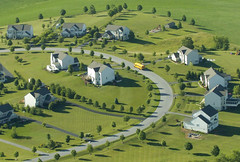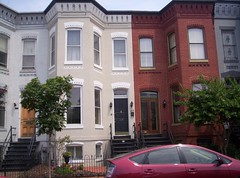It's economics stupid...

Gas mileage aside, the Sequoia Limited remains a powerful and comfortable SUV. (Toyota photo) Caption from the Boston Globe story, "Sequoia SUV is ready for heavy duty," from last month(!!!!).
(A take off on the saying of the Bill Clinton campaign back in 1992...)
Sprawl has always been enabled by the confluence of a number of factors that economists would say generate spillover costs or free rider effects. These factors included a regulatory and financial regime that favored suburban development, the construction of roads and other infrastructure by federal and state governments, enabling cheaper costs for new construction on greenfield land, and cheap gasoline.

Baltimore Sun photo by David Hobby.

Capitol Hill rowhouses take up less land when compared to subdivisions in outlying metropolitan areas.
But cheap energy was and is the most significant factor fueling what I call an "extensive" use of natural resources--energy, land, and building materials. (Extensive means using more. Intensive means using resources more efficiently.) Extensive use of resources is the hallmark of sprawl and the American Dream.
Anyone who writes about "human nature," the American Dream, that it is natural to drive 20 minutes to and from work to decompress (Randal O'Toole) etc. fails to take into account the underlying economics that support and encourage these behaviors. This isn't a cut, but there is a blog entry in All About Cities, "Soaring gasoline prices not a threat to American suburbia," that says that Americans will never change their sprawl behavior.
I disagree. Economics don't lie.
As gasoline prices increase and reach and stay at a new permanently "high" equilibrium price, people will be forced to change their behavior. It's just that it can take years to change these kinds of behaviors because they involve signficant decisions about where people work and live. Overnight, you don't change your domicile.
It's starting with people not buying the biggest possible car or truck and moving to smaller cars. It's starting with people changing their behavior and beginning to ride transit when before they wouldn't, see "Stung at the Pumps, More Hop on a Bus," subtitled "D.C.'s Outlying Transit Systems Rush to Add Capacity; Metro Worried," from yesterday's Post.
And it's visible with the impact of foreclosures on outlying areas specifically--did you see this article in the Post, "Not Even for a Car?," which mentioned that there were 700(!!!!) houses for sale in one particular zip code in Woodbridge in Prince William County, Virginia? The necessity of the car to get around is the real problem, free or not, you still have to pay to maintain it, and buy the fuel to get around.
Transit from far places will continue to allow people to live far from work. But over time these costs will have to rise too (fuel costs for buses are also going up...).
And over time people will begin making decisions to live much closer to where they work.
But it took about 25 years to really see the impact of the subway system on the City of Washington proper (and about the same amount of time for Arlington County--I first moved to DC in 1987 and I worked with a vendor based at the Virginia Square Metro, which was a lot different from today... or remember all the Vietnamese restaurants in Clarendon, etc.).
Likely we are entering a major period of dislocation in American society. I think we are just beginning to see it.
Ironically, President Bush becomes a "green" president because his disastrous policies to foment and engage in war in Iraq has led (likely) to a permanent repricing of oil. Combine this with the inordinate demand for oil in the U.S. being challenged by finite supplies and a massive increase in demand for oil from China and India and the world may truly on the cusp of change. (This I say remembering my fellow progressives arguing that having President Reagan was good, because his negative policies would help people become more politically conscious--it didn't happen. But Bush's policies will drive change like nothing else, because they accelerated a permanent increase in the political and economic cost of oil.)

Levittown house, 1948. Source unknown. Back then most households had one employed adult. Today, most two adult households have both adults employed. This is the source of my joke that polygamy is about to be legalized, because you need three incomes to buy a house. Maybe polygamy will need to be legalized in order to keep sprawl economically viable. Even if the foreclosure crisis drops the cost of housing, perhaps an additional wage earner is required to pay for the cars and the gasoline.
I was on vacation for the last few days--with a slow Internet connection so I didn't post much--and I always like reading newspapers in other communities, especially the letters to the editor pages, where you get a much wider range of opinion and less erudite writers when compared to the Washington Post or the New York Times.
So you read about the vile Communists exploring for oil off the U.S. coast or the need to drill for oil in Alaska, or why aren't prices for gasoline dropping because demand is dropping slightly... uh because worldwide demand is increasing, signficantly, and for the most part supply is stagnant. But I think with the kinds of articles I was reading in those papers, the letters to the editor, the various wire stories about automobile production dropping, the higher and higher cost of flying, etc., that maybe we are on the cusp of change.
The sad thing is that the fuel price increases are mostly benefiting energy producers. Had the U.S. imposed higher gasoline taxes like European countries, the price would have covered more of the economic costs of sprawl culture (just like high taxes on cigarettes are justified by the health costs imposed on society) and led to more economically and societally optimal decision making decades earlier.
This column from Automobile Magazine, "Vile Gossip: Being Fuelish in 1974 Dollars," tells us that gasoline is cheaper today than in 1974, during the days of the first Oil Embargo. And it is true that the U.S. is the third largest producer of oil in the world (but the U.S. is also the number one consumer...).
But combine this with other societal changes: (1) the increased number of two worker families, in large part because of (2) stagnation of wages; plus (3) massive job reductions in various industrial sectors (e.g., today the U.S. produces maybe 25% more steel than it did before the industry went through massive dislocation and change, but with fewer than 25% of the same number of workers); and (4) exurban living, and you understand the reality -- that increased gasoline prices begin to push people over the edge of being able to survive economically, when many of the decisions they made previously were economically sound only when gasoline was cheap and the cost of driving was subsidized significantly (no tolls vs. tolls is the subject of a future blog entry).

From the Post article from yesterday:
Philip Westcott of New Market, a transportation engineer, is an expert on how to get from point A to point B. But he still hasn't found a good rail or bus option for his commute to Baltimore. So he has had to suck it up at the pump, paying $60 to fill the tank of his Nissan Xterra. That lasts for four days of commuting. If it gets much worse, he said, he and his wife will have to join carpools. "If gas prices get above $4.50 or something, that's the only option we have, really," he said.
Driving vs. transit is the first decision point.
Second is where you work vs. where you live today.
Third is where you live vs. where you work tomorrow.
Labels: car culture, energy, sustainable land use and resource planning



0 Comments:
Post a Comment
<< Home